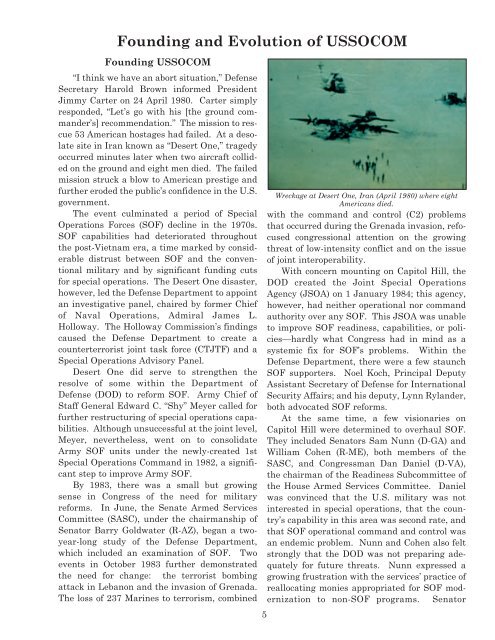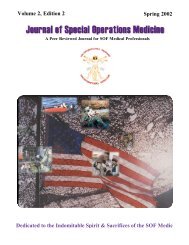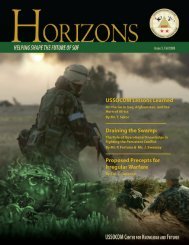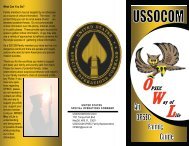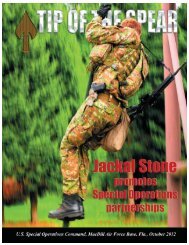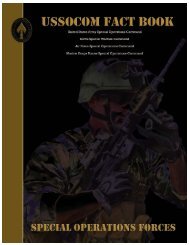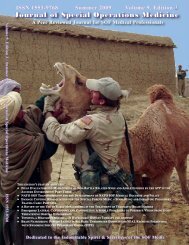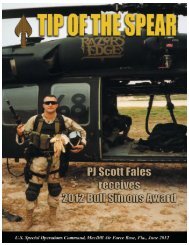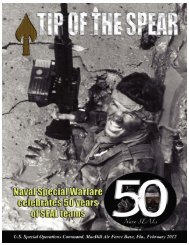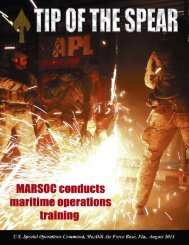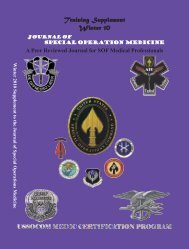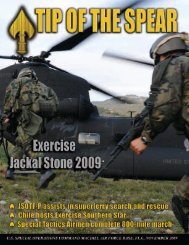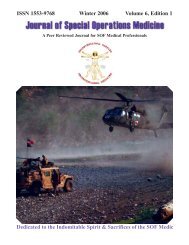HQ$History - United States Special Operations Command
HQ$History - United States Special Operations Command
HQ$History - United States Special Operations Command
Create successful ePaper yourself
Turn your PDF publications into a flip-book with our unique Google optimized e-Paper software.
Founding and Evolution of USSOCOM<br />
Founding USSOCOM<br />
“I think we have an abort situation,” Defense<br />
Secretary Harold Brown informed President<br />
Jimmy Carter on 24 April 1980. Carter simply<br />
responded, “Let’s go with his [the ground commander’s]<br />
recommendation.” The mission to rescue<br />
53 American hostages had failed. At a desolate<br />
site in Iran known as “Desert One,” tragedy<br />
occurred minutes later when two aircraft collided<br />
on the ground and eight men died. The failed<br />
mission struck a blow to American prestige and<br />
further eroded the public’s confidence in the U.S.<br />
government.<br />
The event culminated a period of <strong>Special</strong><br />
<strong>Operations</strong> Forces (SOF) decline in the 1970s.<br />
SOF capabilities had deteriorated throughout<br />
the post-Vietnam era, a time marked by considerable<br />
distrust between SOF and the conventional<br />
military and by significant funding cuts<br />
for special operations. The Desert One disaster,<br />
however, led the Defense Department to appoint<br />
an investigative panel, chaired by former Chief<br />
of Naval <strong>Operations</strong>, Admiral James L.<br />
Holloway. The Holloway Commission’s findings<br />
caused the Defense Department to create a<br />
counterterrorist joint task force (CTJTF) and a<br />
<strong>Special</strong> <strong>Operations</strong> Advisory Panel.<br />
Desert One did serve to strengthen the<br />
resolve of some within the Department of<br />
Defense (DOD) to reform SOF. Army Chief of<br />
Staff General Edward C. “Shy” Meyer called for<br />
further restructuring of special operations capabilities.<br />
Although unsuccessful at the joint level,<br />
Meyer, nevertheless, went on to consolidate<br />
Army SOF units under the newly-created 1st<br />
<strong>Special</strong> <strong>Operations</strong> <strong>Command</strong> in 1982, a significant<br />
step to improve Army SOF.<br />
By 1983, there was a small but growing<br />
sense in Congress of the need for military<br />
reforms. In June, the Senate Armed Services<br />
Committee (SASC), under the chairmanship of<br />
Senator Barry Goldwater (R-AZ), began a twoyear-long<br />
study of the Defense Department,<br />
which included an examination of SOF. Two<br />
events in October 1983 further demonstrated<br />
the need for change: the terrorist bombing<br />
attack in Lebanon and the invasion of Grenada.<br />
The loss of 237 Marines to terrorism, combined<br />
Wreckage at Desert One, Iran (April 1980) where eight<br />
Americans died.<br />
with the command and control (C2) problems<br />
that occurred during the Grenada invasion, refocused<br />
congressional attention on the growing<br />
threat of low-intensity conflict and on the issue<br />
of joint interoperability.<br />
With concern mounting on Capitol Hill, the<br />
DOD created the Joint <strong>Special</strong> <strong>Operations</strong><br />
Agency (JSOA) on 1 January 1984; this agency,<br />
however, had neither operational nor command<br />
authority over any SOF. This JSOA was unable<br />
to improve SOF readiness, capabilities, or policies—hardly<br />
what Congress had in mind as a<br />
systemic fix for SOF’s problems. Within the<br />
Defense Department, there were a few staunch<br />
SOF supporters. Noel Koch, Principal Deputy<br />
Assistant Secretary of Defense for International<br />
Security Affairs; and his deputy, Lynn Rylander,<br />
both advocated SOF reforms.<br />
At the same time, a few visionaries on<br />
Capitol Hill were determined to overhaul SOF.<br />
They included Senators Sam Nunn (D-GA) and<br />
William Cohen (R-ME), both members of the<br />
SASC, and Congressman Dan Daniel (D-VA),<br />
the chairman of the Readiness Subcommittee of<br />
the House Armed Services Committee. Daniel<br />
was convinced that the U.S. military was not<br />
interested in special operations, that the country’s<br />
capability in this area was second rate, and<br />
that SOF operational command and control was<br />
an endemic problem. Nunn and Cohen also felt<br />
strongly that the DOD was not preparing adequately<br />
for future threats. Nunn expressed a<br />
growing frustration with the services’ practice of<br />
reallocating monies appropriated for SOF modernization<br />
to non-SOF programs. Senator<br />
5


